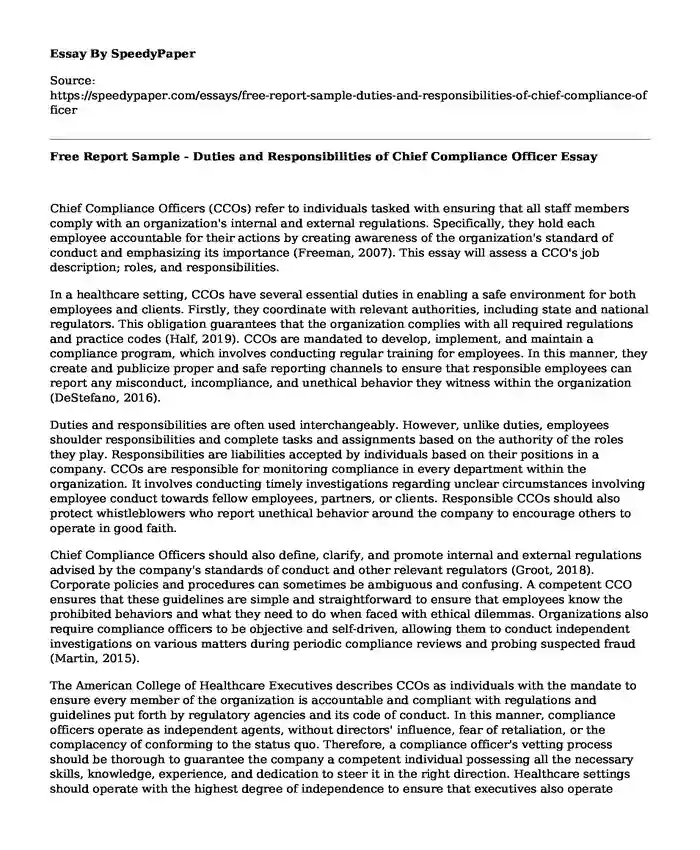
| Type of paper: | Report |
| Categories: | Company Employment |
| Pages: | 3 |
| Wordcount: | 636 words |
Chief Compliance Officers (CCOs) refer to individuals tasked with ensuring that all staff members comply with an organization's internal and external regulations. Specifically, they hold each employee accountable for their actions by creating awareness of the organization's standard of conduct and emphasizing its importance (Freeman, 2007). This essay will assess a CCO's job description; roles, and responsibilities.
In a healthcare setting, CCOs have several essential duties in enabling a safe environment for both employees and clients. Firstly, they coordinate with relevant authorities, including state and national regulators. This obligation guarantees that the organization complies with all required regulations and practice codes (Half, 2019). CCOs are mandated to develop, implement, and maintain a compliance program, which involves conducting regular training for employees. In this manner, they create and publicize proper and safe reporting channels to ensure that responsible employees can report any misconduct, incompliance, and unethical behavior they witness within the organization (DeStefano, 2016).
Duties and responsibilities are often used interchangeably. However, unlike duties, employees shoulder responsibilities and complete tasks and assignments based on the authority of the roles they play. Responsibilities are liabilities accepted by individuals based on their positions in a company. CCOs are responsible for monitoring compliance in every department within the organization. It involves conducting timely investigations regarding unclear circumstances involving employee conduct towards fellow employees, partners, or clients. Responsible CCOs should also protect whistleblowers who report unethical behavior around the company to encourage others to operate in good faith.
Chief Compliance Officers should also define, clarify, and promote internal and external regulations advised by the company's standards of conduct and other relevant regulators (Groot, 2018). Corporate policies and procedures can sometimes be ambiguous and confusing. A competent CCO ensures that these guidelines are simple and straightforward to ensure that employees know the prohibited behaviors and what they need to do when faced with ethical dilemmas. Organizations also require compliance officers to be objective and self-driven, allowing them to conduct independent investigations on various matters during periodic compliance reviews and probing suspected fraud (Martin, 2015).
The American College of Healthcare Executives describes CCOs as individuals with the mandate to ensure every member of the organization is accountable and compliant with regulations and guidelines put forth by regulatory agencies and its code of conduct. In this manner, compliance officers operate as independent agents, without directors' influence, fear of retaliation, or the complacency of conforming to the status quo. Therefore, a compliance officer's vetting process should be thorough to guarantee the company a competent individual possessing all the necessary skills, knowledge, experience, and dedication to steer it in the right direction. Healthcare settings should operate with the highest degree of independence to ensure that executives also operate within the company's legal and ethical standards.
Essential Chief Compliance Officer's roles act as a nexus between regulatory authorities and organizations. Therefore, companies cannot compromise patient-centered care due to business pressure from shareholders and critical decision-makers (Smith, 2020). A competent CCO's firm decisions will be essential in minimizing any incompliance aimed at freeing finances to cover expenses. Additionally, CCOs help minimize punitive measures taken against a company that self-discloses misconduct compared to those exposed through other means. Self-disclosure improves the organization's compliance with regulatory authorities; it illustrates its desire for adherence to all necessary rules and regulations.
References
DeStefano, M. (2016). The Chief Compliance Officer: Should there be a new "C" in the C-Suite? The Practice, 2(5).
Freeman, E. H. (2007). Regulatory Compliance and the Chief Compliance Officer. Information Systems Security, 16(6), 357-361.
Groot, J. (2018). The Chief Compliance Officer. Digital Guardian. https://digitalguardian.com/blog/chief-compliance-officer-what-ccos-do-and-why-your-company-should-have-one
Half, R. (2019). Compliance Officers: What They Do and Why They're in Demand? Roberthalf.com. https://www.roberthalf.com/blog/salaries-and-skills/compliance-officers-what-they-do-and-why-theyre-in-demand
Martin, S. L. (2015). Compliance officers: More jobs, more responsibility, more liability. Notre Dame JL Ethics & Pub. Poly, 29, 169.
Smith, M. (2020). Healthcare Compliance. Thehealthlawfirm.com. https://www.thehealthlawfirm.com/resources/health-law-articles-and-documents /Healthcare/
Cite this page
Free Report Sample - Duties and Responsibilities of Chief Compliance Officer. (2024, Jan 24). Retrieved from https://speedypaper.com/essays/free-report-sample-duties-and-responsibilities-of-chief-compliance-officer
Request Removal
If you are the original author of this essay and no longer wish to have it published on the SpeedyPaper website, please click below to request its removal:
- Human Resources Essay Sample
- Free Essay Example on The Uber Company
- HRM Essay Sample about Employment Strategy
- Paper Example of Annotated Bibliography on Minimum Wage Debate
- Essay Sample on Minimum Federal Wage
- Is Trump the Only One to Blame for the Trade War Between USA and China? Paper Example
- Healthcare Professional Turnover - Essay Sample
Popular categories




